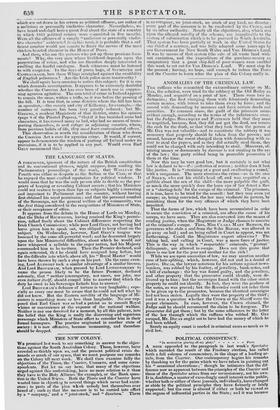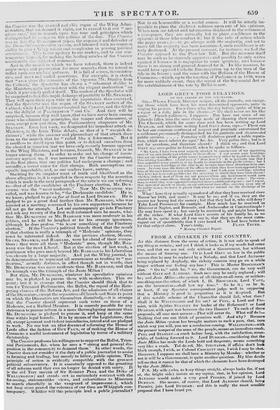POLITICAL CONSISTENCY.
"In irsofkration placing all my glory." Poen A NOTE appended to the paragraph in last week's Spectator which narrated the result of the Finsbury election, has called forth a full column of commentary, in the shape of a leading ar- ticle, from the Courier. Our contemporary begins his remarks by thanking us for the pains which we have taken in pointing out his "occasional aberrations ;" though he intimates that the dif- ference now so apparent between the principles of the Courier and those of the Spectator arises from our inconsistency, not his own. It is, doubtless, a matter of exceedingly small interest to the public, whether both or either of these journals, individually, have changed or abide by the political principles they have formerly or lately supported; but the ease is altered if' either or both be viewed as the organs of influential parties in the State; ani it was because the Courier was he avowed and able organ of the Whig Admi- nistration, that we deemed it right, not to extend to it our " me- be to remark upon the tone and prineipies which 1 distiaguished us ;aye on the polities of the day. The Courier .
was in fee: tles muscat paper, the exponent and defender of the Do-as-?iI'?-as-po:.sible system, and laboured with no common ability to eive a colour and complexion to passing political ore venues. our apology to our readers, and to our con-
temporary hi:a-Leif, for making the leading articles of the Courier oceasiomily 11.e ,td; jcet of cornmeal. And in the art ie!e to which we have referred, there is indeed ample scope and provocation for more remarks than we intend to inflict upon our revelers' patience. It is full of errors, inconsisten- cies, and most unleinded assertions. For example, it is stated, ; that " ever since des secession of the vigorous ?Ir. Stanley from the Cabinet," the Spectator has shown a " vehement dislike to • the Ministers, quite inconsistent with the elegant moderation " on which it previously prided itself. The readers of the Spectator will , be surprised to find this impli: d charge of partiality to Mr. STANLEY. They will open their eyes wide at the imputation thus conveyed, that the Specia!nr was the organ of the STANLEY section of the Cabinet, while Lord A. LTIIORP inspired the Courier, and the Globe , was the delight of PeemeatseoN " and Co." And they will be . surprised, because they well know,t hat we have never been among those who admired the principles, the temper and demeanour, or . even, except now and then, the Parliamentary eloquence of Mr. , STANLEY. Even last week, we designated his impudent attack on Ministers, in the Irish Tithe debate, as that of a " waspish de- claimer ;" while the manner and phraseology of that attack drew from us the remark that he " railed like a fishwoman." But it is needless to dwell upon this point, or to defend ourselves from the absurd insinuation that we have only recently become opposed to the Whig Ministers, and because, forsooth, Mr. STANLEY is no longer among them. In order to make out his charge of incon- sistency against us, it was necessary for the Courier to assume, in the first place, that our politics had undergone a change ; and secondly, a recent cause for that change. Both assumptions are equally improbable, and, as our readers know, untrue.
Startling for its singular want of truth and likelihood as the above allegation is, it is equalled in these respects by the assertion which is made in the next paragraph of the article we are referring
election." If the Courier's political friends think that the result let that subject alone. Your's truly, PLAIN TRUTH. of that election is really a triumph of " Moderate " opinions, they must be infatuated indeed. At the previous election, Messrs. GRANT, SPANK! E, DWI BABI3A GE, were far ahead of their compe- titors: they were all three "Moderate" men, though Mr. BAR- RAGE was the most Liberal. But at the election of last week, a gentleman who goes much beyond Mr. BABBAGE in his Liberalism -.vas chosen by a large majority. And yet the Whig journal, in its determination to represent all occurrences as tending to "mo- deration," actually declares, in effect though not in words, that Mr. DUNCOMBE was more moderate than Mr. BARRAGE, and that his triumph was the triumphs of the Juste Milieu But then, Mr. DuNcosiae, whatever his speculative opinions may be, is pledged to pursue them with moderation. This we grant ; but it is strange that the Courier should think that to rote for Triennial Parliaments, the Ballot, the repeal of the Rate- paying clauses of the Reform Act, and the admission of all claims of the Dissenters, except the separation of Chu rch and State (a point on which the Dissenters are themselves disunited),—it is strange that the Courier should represent such votes as those of a Moderate, not a Radical Member. It is scarcely possible for any statesman to pursue reform in a more thoroughgoing manner than Mr. DuNcomne is pledged to pursue it, and keep at the same time within legal bounds. It is by means of the Legislature, that all, except ignorant and violent incendiaries, intend and are pledged to work. No one but an idiot dreams of reforming the House of Lords after the fashion of GUY FAUX, or of making the House of Commons a useful instrument of legislation by terror of a military dictatorship.
The Courier professes his willingness to support the Ballot, Trien- nial Parliaments, &c. when he sees a " strong and general dis- position in the community to demand them." In other words, the Courier does not consider it the duty of a public journalist to assist informing and leading, but merely to follow, public opinion. This principle of action is evidently compatible with the grossest political subserviency. It is essentially opposed to the granting of all reforms until they ran no longer be denied with safety. It IS the old Tcry maxim of Sir ROBERT PEEL and the Mike of WELLINGTON; and stands out in melancholy contrast with the far-seeing, statesmanlike views, and exhortations to Ministers to march cheerfully in the vanguard of improvement, which not long since graced the'columns of our then un-Whiggish con- temporary. Whither will this principle lead a public journalist? proposal that I have heard yet. Not in an honourable or a useful course. It will be utterly ins- possible to place the slightest reliance upon any of his opinions. NI hen men see talent and information displayed in the columns of a newspaper, they are nattnally led to place confidence in the opinions of those who conduct it but it' the rule of action which the paper avows is—to go always with the majority, and not to move till the majority has been ascertainei, such coufuleece is ut- terly destroyed. At the present moment, for instance, we find the Courier opposed to the Poor-law Bill. But the measure itself may be such as he sincerely approves; and possibly he only writes against it because it is unpopular in some quarters, and because there is no strong and general demand for it. In like manner, he would have cpposed Catholic Emancipation up to the turn of the tide in its favour ; and the saute with the Reform of the House of Cotninons,—which, up to the meeting of Parliament in 1830, was a far more unlikely event, than the repeal of the Septennial Act or the establishment of the vote by Ballot is now.





















 Previous page
Previous page